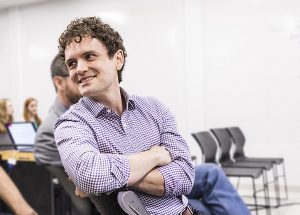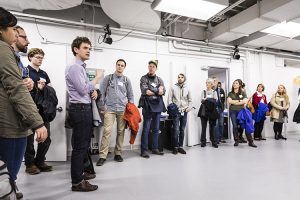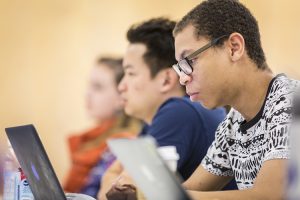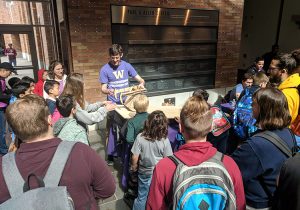Story by Wayne Gillam | UW ECE News

UW ECE assistant professor Sam Burden was recently named as a recipient of a National Science Foundation (NSF) CAREER award, one of the most prestigious awards in the nation for early-career faculty. 2017 photo by Mark Stone
UW ECE assistant professor Sam Burden was recently named as a recipient of a National Science Foundation (NSF) CAREER award, one of the most prestigious awards in the nation for early-career faculty. The award will fund research by Burden that seeks to build fundamental knowledge related to human-machine interaction as well as education and outreach initiatives aimed at broadening participation of underrepresented students in science, technology, engineering and math (STEM).
“I am thrilled and honored to have my proposal selected for funding,” Burden said. “The award holds special significance for me, as it will merge two disparate threads of research I started while working on my doctoral degree, and it will expand opportunities for students to be exposed to and involved in this research.”
The NSF selects award recipients who are faculty members at the beginning of their careers with the potential to serve as academic role models in research and education and to lead advances in the mission of their department or organization. The intent of the NSF CAREER program is to provide stable support, enabling awardees to develop their careers not only as outstanding researchers, but also as educators demonstrating commitment to teaching, learning and dissemination of knowledge. The award spans five years, and it will enable Burden to integrate his research and education goals, contributing to his stated long-term career goal of enhancing human interaction with the physical world through machines.
Building foundational knowledge for human-machine interaction

Burden at the opening of the UW AMP Lab, where research supported by the award, experiments involving human/machine interaction, will take place. 2017 photo by Mark Stone
A remotely operated airplane, a self-driving car on a smooth road, or a Roomba cleaning the floors in your house are all examples of machinery that function well in an unchanging environment where contact with the surroundings is continuously maintained. But what happens when contact with the environment is intermittent or conditions change? Programming a robot or a machine, whether remotely operated by a human or operating independently, to handle “contact-rich dynamics” such as this is much more difficult to do. For example, making a legged robot walk up and down stairs or travel over rough, unpredictable terrain in natural environments has proven to be a very tough problem for engineers.
“Every time a robot or machine touches something new, more constraints are introduced into the system and the dynamics change abruptly,” Burden said. “That’s a fundamentally challenging problem for systems that function independently, let alone systems that combine human and machine intelligence.”
Burden seeks to address this challenge. In the research supported by the award, he is aiming to build a better understanding of how humans control remotely operated robots and machinery when the system makes intermittent contact with its environment under variable conditions. The knowledge gained can be applied to both remotely operated and autonomous systems. This will help to inform development of useful devices such as robots and machinery that could efficiently deliver packages and move around a city, assist with disaster recovery or remote surgeries, or even operate as caregivers in people’s homes.
“Through our experiments we’ll learn more about what a person’s control strategy is while they are tele-operating a robot or machinery,” Burden said. “We’ll learn what information is useful to them, what information is irrelevant for that task, and then we’ll adapt the machine interface to improve performance, with the human still in the loop.”
There is a wide range of potential applications for this knowledge, but Burden said that he sees this work being particularly useful for neural engineering in assistive devices, enabling better two-way communication between brain and machine, and with rehabilitation after bodily injury.
“To put a finer point on it, this research could help inform development of an active leg brace for when you sprain your ankle, or a neuroprosthetic for when you lose a limb, or a rehabilitation robot to help take care of you after an accident,” Burden said.
Burden and his team will build and test mathematical models for contact-rich dynamics both in theory and with human test subjects interacting with machines. The real-life experiments will take place at the AMP Lab on the UW campus, where Burden’s robotic testbed is located.
Broadening participation of underrepresented students in STEM

Education and outreach initiatives are also important components of the work supported by the award. Burden stated that he feels a strong commitment to these efforts as a first-generation college student who benefited in high school from a UW summer institute for mathematics. The initiatives also connect well with his role as UW ECE Diversity, Equity and Inclusion Coordinator. 2016 photo by Mark Stone, courtesy of the Center for Neurotechnology
Education and outreach initiatives are also important components of the work supported by the award. Burden stated that he feels a strong commitment to these efforts as a first-generation college student who benefited in high school from a UW summer institute for mathematics. The initiatives also connect well with his role as UW ECE Diversity, Equity and Inclusion Coordinator.
“There’s so much scientific advancement and technological innovation that we are missing out on because of systemic exclusion and marginalization of large groups of people,” Burden said. “I’m certain that I wouldn’t be here in this job if that door hadn’t been opened for me, and so, I’m eager to open as many of those doors as I can for other people.”
Burden is already heavily involved in UW College of Engineering K–12 outreach programs such as Engineering Discovery Days and outreach tailored specifically for underrepresented students such as the STARS program. And at UW ECE, he has co-led efforts to expand diversity, equity and inclusion with colleagues such as Niveditha Kalavakonda. The support he receives from the award will allow him to take this work even further over the next five years.
“I was very deliberate in putting together the education and outreach component supported by the award,” Burden said. “I chose initiatives that were evidence-based, that have proven successful in other contexts, and that build-up or expand on existing programs.”

Engineering Discovery Days at the UW College of Engineering. The award will enable Burden and his research team to expand their ability to regularly exhibit and present at public events such as these. 2018 photo by Sam Burden
The award will enable Burden and his research team to expand their ability to regularly exhibit and present at public events involving large numbers of students, families and teachers, such as Engineering Discovery Days and UW Math Day. It also will provide resources for Burden to create a new site for an alternative spring break program run by Riverways, a K–12 outreach program that connects UW undergraduate students with educational and service opportunities. The organization is part of the Community Engagement & Leadership Education Center at the UW, and it has relationships with a number of middle schools and high schools in Latinx and tribal communities across the state.
“One thing I like about the NSF award is that it’s not draining resources from Riverways,” Burden said. “It’s providing an external source of additional funding to help expand the program.”
In the STARS program, Burden has already coordinated a faculty mentorship network, which matches students with UW faculty who are from departments the students have expressed an interest in. He is planning to use support from the award to help some of these students be placed in research labs within their first two years at the UW. This will give STARS students an immersive, hands-on educational experience right at the start of their academic journey.
Burden has placed a strong focus on cooperating across campus to create, improve and build upon existing outreach programs. And when talking about the NSF CAREER award, the research it supports and the education and outreach initiatives it enables, he repeatedly emphasizes the importance of working together to achieve mutually agreed upon goals.
“None of my work would be possible without the mentorship and leadership provided by my advisers and teachers, nor without the support and structure provided by UW ECE, nor without the creativity and energy provided by my students and collaborators,” Burden said. “I am simultaneously deeply humbled and proud to be a part of such a diverse, intellectual community.”
To learn more about the research, education and outreach programs supported by this NSF CAREER award or to discuss ongoing work expanding diversity, equity and inclusion at UW ECE, contact Sam Burden.

